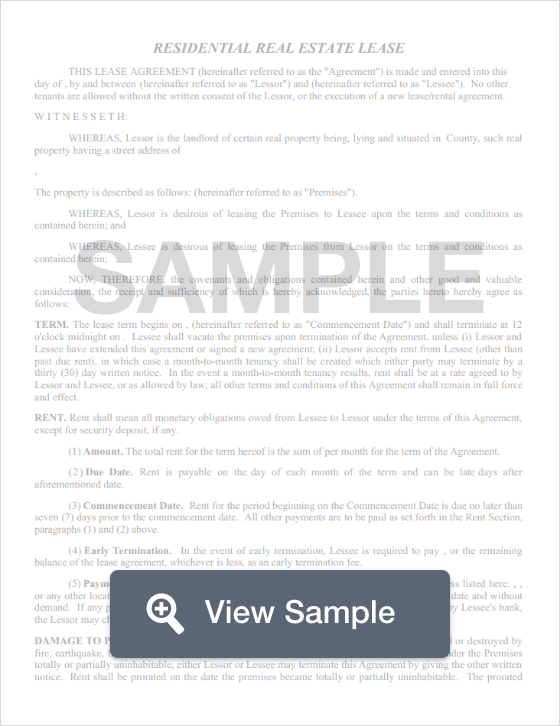Make a Florida Lease Agreement
Create a Florida Lease Agreement with our customizable template!

What Is a Florida Lease Agreement?
A Florida lease agreement is a legally binding real estate contract between a landlord or property management company and the tenants. When it is signed and dated by the parties, the tenant is then able to take legal possession of the rental property. A Florida lease agreement can be used for residential or commercial property.
Looking for other Florida documents?

Business
- Florida Non-Compete Agreement
- Florida Non-Disclosure Agreement
- Florida Promissory Note

Personal
- Florida Last Will and Testament
- Florida Living Will
- Florida Power Of Attorney

Real Estate
- Florida Bill Of Sale
- Florida Eviction Notice
- Florida Month-to-Month Lease Agreement
- Florida Quit Claim Deed
- Florida Rental Application
- Florida Sublease Agreement


Sample Florida Lease Agreement


Search Documents
Related Documents
Looking for other Florida documents?

Business
- Florida Non-Compete Agreement
- Florida Non-Disclosure Agreement
- Florida Promissory Note

Personal
- Florida Last Will and Testament
- Florida Living Will
- Florida Power Of Attorney

Real Estate
- Florida Bill Of Sale
- Florida Eviction Notice
- Florida Month-to-Month Lease Agreement
- Florida Quit Claim Deed
- Florida Rental Application
- Florida Sublease Agreement
Most Commonly Used Florida Lease Agreements
In the State of Florida, the most commonly used lease agreements are standard residential lease agreements, commercial lease agreements, month to month lease agreements, roommate agreements, and sublease agreements. While subleasing is fairly common in Florida because of part-time residents, it's important to read the master lease to determine whether subleasing is allowed.
Although the most commonly used Florida lease agreements have most of the same elements, they may still be distinct in their own ways. For example:
- A roommate agreement includes many of the standard clauses involved in a residential lease. However, it also explains which areas are for the exclusive use of the roommate and which areas are considered common and may be used by all occupants.
- A standard residential lease agreement generally lasts for one year. When the year ends, the lease could automatically renew for another year or it may switch to a month-to-month lease. However, both may have a clause that states if either party doesn’t wish to renew the lease, they must provide a 30-day written notice to the other about vacating the property.
How to Write a Florida Lease Agreement
All Florida lease agreements must comply with Florida landlord-tenant laws. If they don’t, they are unenforceable. There are other laws that must be considered as well. You’ll learn more about those under the sections related to disclosures and security deposits.
Because a lease agreement is a legally binding contract, you should read the terms thoroughly before you sign it. When in doubt, take it to have it reviewed by an attorney before you sign it.
A Florida lease agreement needs to include:
- Names of the Parties - This includes the landlord's full name or the property management company's legal business name as well as the full name of the tenant(s).
- Property Address - This is the full address for the leased space or rental property. It should include the city, zip code, and the lot or unit number.
- Term Information - This is the type of lease agreement the parties agree to enter into. For example, a month-to-month lease or a fixed term. A fixed-term lease means that the parties agree that the tenant will hold possession of the space for a certain amount of time, usually one year. If it is a fixed lease, this section should include the date that the lease will end.
- Rental Amount - This includes the date that the lease will begin, the amount of the monthly rent, the day of the month that rent is due, and the address where the rent may be paid.
- Late Fees - This is any applicable fee that is due if the rent is not paid by a certain date. It should include the amount that must be paid and the date by which it must be paid.
- Security Deposit - This is the amount of deposit that must be paid in advance of the tenant taking control of the property. A security deposit is used to repair damages caused by the tenant.
- Initial Payment - This is the total amount of money that the tenant must pay to move into the property. This area should include the amount of the first month's rent, the security deposit, and the total of the two numbers added together.
- Occupants - The full name of each tenant must be listed even if they are a minor or are not signing the lease for some reason. This part of a Florida residential lease agreement establishes who will reside in the residential unit. For commercial space leases, it designates those who have permission to use the space. If the presence of additional occupants changes the price of the rent, it should be included in this section.
- Utilities - This area notes which utilities or services a tenant does not pay.
- Parking - This area informs the tenant if they will receive a parking space. If a parking space is reserved and there is a designated spot, the spot should be listed in this section.
- Furnishings - This section tells the tenant what they are allowed to install (such as a washing machine or dishwasher) or what they may not install. If the tenant is not allowed to bring their own appliances, that should be designated in this section.
- Notices - This section lists the names of both the landlord (or the property manager) and tenant along with their mailing address. This contact information should be used if the parties need to send out a notice to the other party for some reason.
- Eviction - This section informs the tenant about how eviction proceedings would move forward in the event of nonpayment or for a breach of other lease terms.
- Additional Terms - This section lists any other obligations that the parties agreed to that haven't been included in any other section of the lease agreement.
- Signature and Date - The document should be signed and dated by all parties.
Which Disclosures Belong in a Florida Lease Agreement
Under Florida landlord-tenant law, a Florida rental lease agreement must include certain disclosures and specific information about the landlord's right to access the rental unit.
- Under Florida state law, the landlord or property manager must provide at least 12 hours of notice before they enter the rental property. There are also certain hours that must be abided by. There are also certain exceptions where the landlord can enter without the 12 hours notice.
- The landlord or their authorized agent must be identified in the Florida lease agreement. Their address(es) must also be listed.
- If a building is more than three stories high, the landlord is required to inform the tenant of any fire protection systems that exist.
A disclosure related to radon gas must be included in the Florida lease agreement. This written notice must be specifically worded:
RADON GAS: Radon is a naturally occurring radioactive gas that, when it has accumulated in a building in sufficient quantities, may present health risks to persons who are exposed to it over time. Levels of radon that exceed federal and state guidelines have been found in buildings in Florida. Additional information regarding radon and radon testing may be obtained from your county health department.
What You Need to Know About Florida Lease Agreement Deposits
You must include a security deposit receipt and a very specific statement under Florida law. Although there is no limit on the amount a landlord may request for a security deposit, the landlord must inform the tenant within 30 days of where the money is held and whether the account it rests in is interest or non-interest bearing. Deductions may be made from the security deposit. Any remainder, if deductions are made, must be returned to the tenant within 30 days of vacating the premises. If there are no deductions from the security deposit, it must be returned within 15 days.

Create a Florida Lease Agreement in minutes with our professional document builder.













